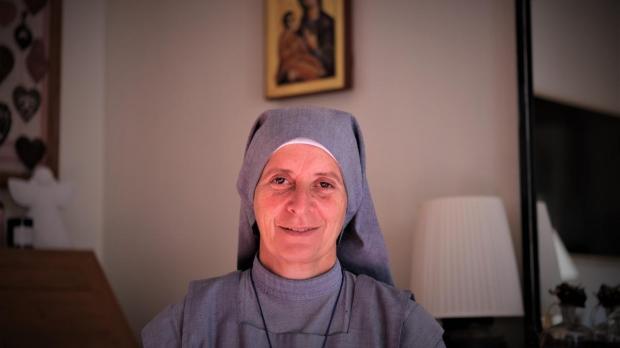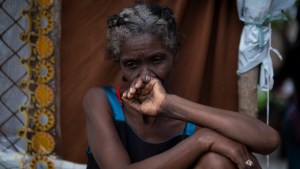Many would have given up in the face of the difficulty of this mission. In Haiti, where Sister Paësie gives herself body and soul to her apostolate, the cause seems lost and the panorama dark.
The situation of politics, society, and safety in this Caribbean state is chaotic, as the missionary explained to Aleteia:
“The violence of armed gangs is getting worse and worse. It used to be limited to the shantytowns, but now it’s even spreading to the wealthy neighborhoods.”
The two entrances to Port au Prince have been taken over by the gangs, which makes it impossible to move around. There are few or no supplies, many crops have been lost due to attacks on transportation, and there’s no gasoline except on the black market, where it’s resold at fifteen times its initial price.
Hope for the children
Children are the first to suffer from this anarchy. The school year didn’t start in September, leaving the children idle in a country paralyzed by inflation and brutal gang violence. But in the midst of this debacle, there’s Kizito, the association created by Sister Paësie in 2018 specifically for Haiti, after leaving the congregation of the Missionary Sisters of Charity.
Since its inception four years ago, Kizito has established several facilities to allow children in the Cité-Soleil slum, the largest in the country, to be educated and catechized and to have access to recreation. Four homes for boys and one for girls have been created, and eight schools have been opened as well.
“We’ve spread them throughout the slum to avoid internal conflicts, because the different neighborhoods of Cité-Soleil are constantly at war with each other, and we really want the school to be a sanctuary for these children so that they feel safe,” explains Sister Paësie.
When it comes to teaching, “we train young people from the shantytown a little on the job, which allows them to obtain an income in parallel with their studies.” All of these centers also allow the children to avoid as much as possible the bullets that kill every day. Sometimes they even manage to get through the iron sheets often used in shanties of the slum.
On Thursday, October 20, a 13-year-old boy, Gethro, died after an exchange of fire by the gangs. He had been in school with Kizito, but had finally dropped out. Others fight to stay in school, and become living examples of generosity, like Julio, 10, who goes to collect scrap metal from the garbage between classes to sell it.
Sister Paësie explains, “One morning, a teacher told me that he’d arrived with his brand new books, which he’d bought with that money. The next day, she saw him with another book in his hand, which he gave to a student. The next day, the same thing happened. In fact, he’d spotted all the students in the classroom who didn’t have books and gave them a new one with the money he’d collected. He’s a child who doesn’t eat every day, who knows hunger. Yet he’s able to put the needs of others before his own.”
Providing catechesis and sacraments
There’s only one parish in the entire slum, attended by only the people of one neighborhood because of the gangs that prevent Haitians from coming and going. Kizito’s catechism centers, which are also free, try to make the sacraments accessible to as many children and their families as possible. Requests for baptism are frequent and inspire genuine fervor. “The children who’ve received the sacraments remain very religious most of the time; many of them become catechists themselves, set up prayer groups…”
Hunger, disease (AIDS, tuberculosis, and cholera are ravaging the country, while COVID has strangely hit the country less severely), daily kidnappings, murders, rapes, and earthquakes… All these circumstances that at first sight might cause deep despair, nevertheless haven’t taken away the faith of the Haitians, who are endowed with a resilience that is unfailing. Resilience coupled with a humble abandonment to the hand of God. “Here and now” seems to be the true motto of the Kizito family and the Haitians.
“We live from day to day. You can even feel it in the way the children we teach pray. They thank God for giving them another day and for returning home safely.”
In spite of the violence and death that are omnipresent, the Christians of Haiti hold on to their faith, even in the most disastrous situations. When asked if the suffering doesn’t sometimes create a feeling of revolt, leading to the abandonment of the faith, Sister Paësie smiles and immediately replies,
“Not there. That’s here (in Europe and in the developed countries). They continue to believe in the presence and benevolence of God, and that’s what keeps them going. I saw this especially after the earthquake in 2010: people were able to speak with great peace even though they were next to the remains of their children. They never rebel against God, nor do they accuse him. In Creole, they say ‘Bon Dieu connaît,’ which means ‘God knows.’”
To donate to Sister Paesie’s ministry in Haiti, or to find out more, visit Kizito Family Haiti-USA, Inc. All donations go directly to support the ministry.



